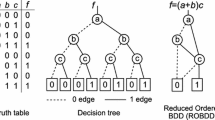Abstract
Both automated design and knowledge discovery of electronic circuits are challenging tasks for artificial intelligence. A genetic algorithm (GA) based approach to them was proposed in this paper, which features an array-based encoding scheme, a multi-objective evaluation mechanism and an adaptation strategy for GA parameters. It was validated by the experiments on arithmetic circuits of gradually increasing scales, which evolved multi-objective optimized circuits and revealed some novel and generalized principles.
This work was partially supported by National Natural Science Foundation of China under grant 60374063, and granted financial support from China Postdoctoral Science Foundation.
Preview
Unable to display preview. Download preview PDF.
Similar content being viewed by others
References
Yao, X.: Promises and Challenges of Evolvable Hardware. IEEE Trans. SMC 1, 87–97 (1999)
Zhao, S.G.: Study of the Evolutionary Design Methods of Electronic Circuits. PhD. dissertation, Xidian University, Xian, China (2003)
Koza, J.R.: Genetic Programming: On the Programming of Computers by Means of Natural Selection. MIT Press, Cambridge (1992)
Miller, J.F., et al.: Principles in the Evolutionary Design of Digital Circuits: Part I. Journal of Genetic Programming and Evolvable Machines 1, 8–35 (2000)
Coello Coello, A.C., et al.: Use of Evolutionary Techniques to Automate the Design of Combinational Circuits. Int. Journal of Smart Engineering System Design 4, 299–314 (2000)
Author information
Authors and Affiliations
Editor information
Editors and Affiliations
Rights and permissions
Copyright information
© 2005 Springer-Verlag Berlin Heidelberg
About this paper
Cite this paper
Zhao, S., Jiao, L., Tang, M. (2005). Automated Design and Knowledge Discovery of Logic Circuits Using a Multi-objective Adaptive GA. In: Zhang, S., Jarvis, R. (eds) AI 2005: Advances in Artificial Intelligence. AI 2005. Lecture Notes in Computer Science(), vol 3809. Springer, Berlin, Heidelberg. https://doi.org/10.1007/11589990_128
Download citation
DOI: https://doi.org/10.1007/11589990_128
Publisher Name: Springer, Berlin, Heidelberg
Print ISBN: 978-3-540-30462-3
Online ISBN: 978-3-540-31652-7
eBook Packages: Computer ScienceComputer Science (R0)




